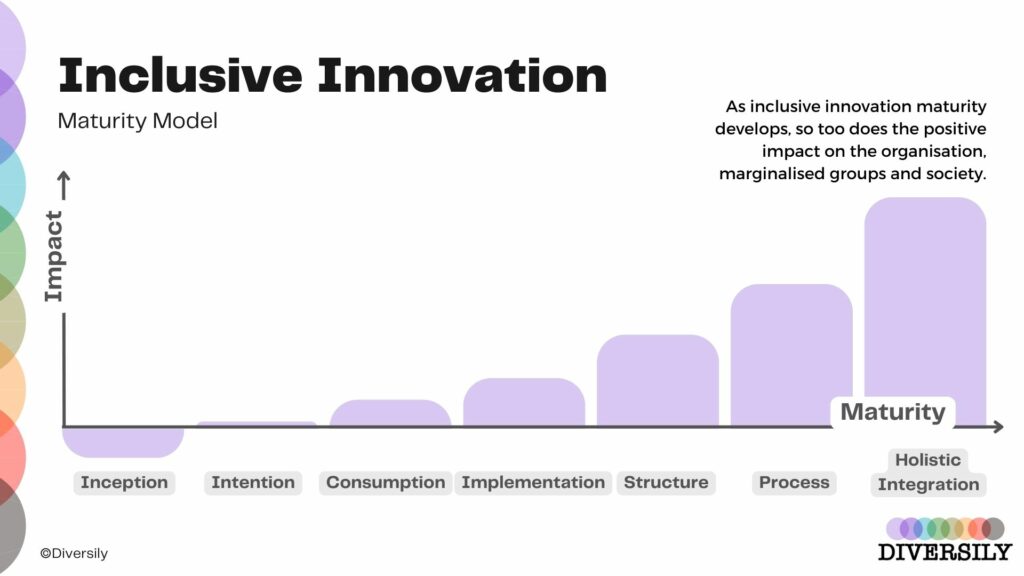Over the last 6 months, Diversily have been collaborating with the team at Henley Business School on a research project focused on inclusive innovation.
The team were nominated for the Professor Rober Pearce Prize in Innovation with a focus on Sustainable Development Goals, which is a new prestigious award at the University of Reading.
We caught up with Sam Cotton, one of the researchers, to share his highlights.

Project Overview
Our team have been exceedingly passionate about this project throughout its process.
The goal of the project was to conduct thorough research to understand the current maturity of inclusive innovation within the digital technology industry, understand the return on investment (ROI) of inclusive innovation for organisations and to measure the potential effectiveness of the Diversily Inclusive Innovation Playbook. We conducted interviews with local digital technology organisation representatives, produced surveys that were distributed globally, and referred to secondary data to understand the current climate.
The project has been a highly valuable experience for our team. It has deepened our knowledge on inclusive innovation, a topic that is hugely relevant and important within the contemporary business world, enabling critical conversations between students and organisation representatives. Our team will certainly take our new learnings on inclusive innovation forward into our careers to continue to contribute and help build towards more equitable industries and societies.
Key Findings
- The project’s findings highlighted low industry maturity regarding current inclusive innovation practices within organisations.
- Insights from the project outlined further evidence of the ROI of inclusive innovation.
- The Diversily Inclusive Innovation Playbook was found to be a valuable, educational and practical tool that fills an existing gap.
- In the spirit of the Playbook philosophy of collaborative and continuous evolution, the project recommended a number of enhancements; the most significant being the introduction of an inclusive innovation maturity model.
- Promoting and enhancing the Diversily Inclusive Innovation Playbook will build more sustainable, equitable and just industries and society.
Inclusive Innovation
Inclusive Innovation is the development of new ideas which aspire to create opportunities that enhance social wellbeing. The Inclusive Innovation Playbook highlights that innovating inclusively means catering for diverse needs and creating an overall positive impact, through adopting inclusive practices and by creating inclusive and equitable experiences for all users, thereby avoiding exclusion, and ensuring diverse participation.
Industry Maturity
The project’s findings highlighted low industry maturity regarding current inclusive innovation within organisations. The insights suggested that although there was a trend in data suggesting that organisations placed a high level of responsibility on ensuring inclusive innovation, the project found that organisations long-term commitment and investment into inclusive innovation were at low to moderate levels, suggesting a lack of practical, long-term implementation of strategies.
Furthermore, the project found that a large percentage of respondents found that their organisation’s practices had lower levels of inclusivity. 91% found that leadership is low to medium levels of inclusivity, 70% found that the culture of their organisation is low to medium levels and 82% found that their recruitment was also low to medium levels. Interestingly, many of these same respondents stated that their products have higher levels of inclusive innovation, for example, one respondent stated that they have incorporated deaf accessibility features within their product. Whilst accessibility standards are well established, approaches for inclusion across other dimensions such as gender, ethnicity, socioeconomic status and sexuality are less common.
These results ultimately highlight the need for The Inclusive Innovation Playbook as a vital tool to tackle the low industry maturity, by guiding organisations to employ and sustain effective inclusive innovative initiatives throughout their operations.
Return on Investment
Insights from the project outlined further evidence of the ROI of inclusive innovation. The research suggested that 82% of respondents stated that when searching for a job they were more likely to apply for roles at organisations with higher levels of inclusive innovation. A threefold increase in performance was also found amongst organisations with higher levels of inclusive innovation maturity, as well as a 19% increase in innovation revenue and capacity. The 27% of individuals from our study who found their organisations to have higher levels of inclusive culture, all felt empowered to perform their best at work and their job enjoyment was at higher levels than individuals at lower inclusive culture organisations. Overall, this evidence of ROI only provides more support for the need for organisations to adopt the inclusive innovation guidance from The Playbook.
Playbook Analysis
A key part of the project was the analysis of the Inclusive Innovation Playbook. The research highlighted that individuals found the Playbook to be very clear and easy to follow. The project also highlighted how respondents felt that the Playbook successfully reinforced the importance of investment and proactiveness in ensuring inclusive innovation. They felt it wasn’t just a resource of theory, but instead of realistic and practical guidance; a tool for driving meaningful change.
Playbook Recommendations
Maturity Model
An exciting aspect of the project for our team was the opportunity to make suggestions for enhancements to the Playbook. It allowed us the freedom to apply our knowledge of academic theory to develop practical suggestions, thereby contributing to the content of the Playbook.
The project’s first suggestion was the inclusion of a preliminary design of a Maturity Model. We designed this model for organisations to benchmark their inclusive innovation maturity. Organisations can use this model to understand their current level and how to improve, to reach the last stage that theoretically implies inclusive innovation influences the core behaviours of an organisation. This preliminary design, along with further development from Diversily, has ultimately produced this model:

Maturity Stage
0 – Inception
Stage Description
1 – Intention
2 – Consumption
Diversified user base and organisational learning.
3 – Implementation
4 – Structure
5 – Process
6 – Holistic Integration
More details on this Maturity Model can be found within the Inclusive Innovation Playbook.
For organisations to assess which stage of the Maturity Model they’re currently situated within, Diversily have created a new Inclusive Innovation Maturity Self-Assessment. This assessment will help an organisation understand their level of maturity in adopting inclusive innovation practices and provide them with valuable insights into their current state, helping to identify areas for improvement.
Inclusive Innovation reward schemes
Another suggestion of enhancement from the project outlines expanding the awareness of Inclusive Innovation schemes that are set up to encourage this innovation in organisations. For example, InnovateUK’s award was highlighted, whereby a £50,000 grant is presented to an organisation that has proven to implement successful inclusive innovation practices. You will now be able to find more detail on InnovateUK’s award within the Playbook.
SWOTIE framework
The final recommendation from the project for enhancing the Playbook is the implementation of the SWOTIE framework as a visual diagram. This framework is an Action SWOT analysis with inclusive innovation in the centre of the framework. The framework aims to create action steps for organisations to understand how to sustain and capitalise on the strengths and opportunities and tackle the weaknesses and threats related to innovating more inclusively.
Final words
Overall, we hope that this project will trigger further action from the research participants within their organisations to encourage higher levels of commitment, investment and implementation of inclusive innovation. It has sparked important conversations on the topic between our team, Diversily and the research participants, that has brought light to a topic that is commonly misunderstood within business. Respondents have outlined how they would highly recommend the Playbook to their colleagues and how taking part in the research has deepened their learning on the topic and added more value to their work.
We would like to thank Marissa and Diversily for allowing us the opportunity to work on such a valuable project and supporting us at every step throughout this process.




